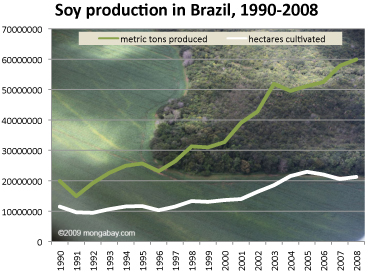The Dutch food and feed industry has bought the first soy produced under the principles of the Round Table on Responsible Soy (RTRS), a body that aims to bring more socially and environmentally sustainable soy to market.
The first 85,000 tons of RTRS certified soy originated from Grupo André Maggi, a Brazilian producer with operations in Mato Grosso. 70,000 hectares of soy across two Grupo Maggi farms were certified by independent auditors in May 2011.
The involvement of Grupo Maggi is significant because the firm was a major target of environmental activists only a few years ago. But a 2006 campaign by Greenpeace, which linked soy-based feed used to fatten chickens for fast food chains in Europe to destruction of the Amazon rainforest, accelerated the industry’s interest in devising mechanisms to bring soy produced in less-damaging ways to market. Grupo Maggi has since taken a leadership role in pushing “responsible” soy, sometimes over the objections of other Brazilian producers who prefer business-as-usual approaches.
The RTRS standard was developed through a multi-stakeholder process which involved including producers, buyers, NGOs and investors. The standard aims to reduce pesticide use, respect the land rights of local communities, and ensure soy expansion don’t take place at the expense of high conservation value ecosystems.
The RTRS shipment comes several months after the Netherlands committed to only using palm oil certified under the Roundtable on Sustainable Palm Oil (RSPO) by 2015. The Netherlands is Europe’s largest trader of palm oil, an agricultural product that has at times been linked to deforestation in Indonesia and Malaysia. The RSPO has the same objectives at RTRS: bring to market product that has been certified under environmental and social criteria.
 |
WWF, an environmental group that has backed both initiatives, hopes agricultural certification can transform supply chains by substantially improving the environmental performance of production.
“This is a historic moment in efforts to bring certified soy to the global marketplace – an important tool to help stop deforestation caused by soy expansion into our remaining forests and other biomes,” said Cassio Moreira, Coordinator of WWF Brazil’s Agriculture and Environment Program and a member of the RTRS board.
“However, there is still a long way to go before the RTRS can realize its vision for a transformed mainstream soy industry. WWF calls on all buyers of soy, including retailers, manufactures and animal feed producers to commit to RTRS soy and begin purchasing it as soon as possible.”
In the early 1990s soy emerged as a major driver of deforestation and conversion of the Amazon rainforest and the adjacent grassland called the cerrado. But a 2006 moratorium on forest clearing for soy production — a response to the Greenpeace campaign — helped slow conversion of rainforest areas. Since then the Brazilian government has enacted a program to slow conversion of the even more endangered cerrado.
Related articles